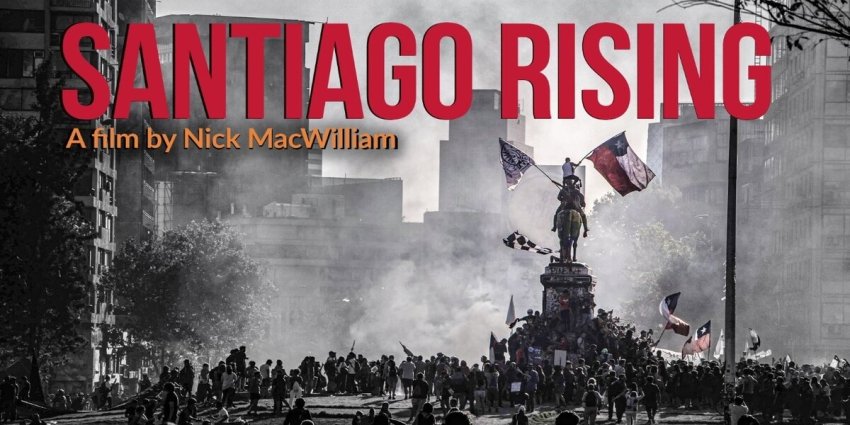
Santiago Rising
By Nick MacWilliam
Alborada Films, 88 minutes
Special Green Left/Alborada Films screening on February 6.
Tickets here
Starting in October 2019, Chile was rocked by a huge, months-long rebellion as hundreds of thousands of people took to the streets across the country. Though triggered by a subway fares rise, the uprising was about much more.
"It's not about 30 pesos; it's about 30 years" quickly became one of the main slogans of the protests — a reference to the three decades of neoliberal policies that had sharpened inequality in the South American nation.
Santiago Rising, a new Alborada Films documentary by British filmmaker and journalist Nick MacWilliam, takes viewers to the streets of Chile’s capital as these protests unfolded and introduces them to the social movements, protesters and ordinary people behind the rebellion.
Speaking to Green Left, MacWilliam explained: “I spent four years living in Chile. During that time, I became quite familiar with a lot of the issues addressed in the film and that were fundamental to creating the conditions that led to the social explosion.
“I also became familiar with the different social movements, such as the student movement, the Mapuche movement, the feminist movement and the movement for justice for the victims of the military dictatorship.
“All of these movements, each with their own core demands, share some crossover and are united by the fact that they are all fundamentally opposed to the neoliberal system — a neoliberal system that in Chile was imposed through a military coup and extreme state violence.”
Until recently, Chile’s economic and political system was portrayed as a neoliberal success story. Left out of the narrative was its origins in the brutal military dictatorship of General Augusto Pinochet.
“Since the dictatorship”, MacWilliams said, “Chile has had a reputation as a stable and economically successful country by Latin American standards. But in reality, social and political tensions have existed for a long time under the surface.
“So when this social explosion happened, for me it wasn't too much of a surprise. Perhaps the scale of the social explosion was, but not the fact that it had occurred.
Through Santiago Rising, MacWilliam said, “I wanted to portray the reality of Chile from the view of the people on the ground, as a country that I was familiar with and had grown to admire.”
Particular emphasis is given to the prominent role of music and arts in the protest movement.
Asked about any lessons that can be drawn from the protests, MacWiliams said: “Being there at the time and seeing how the movement for change in Chile was so grassroots, so organic, so incredibly powerful, for me a lesson is the need to build social movement power, the need to organise politics outside of formal institutions.
“What I saw in Chile was politics that was coming from the streets, from the community, from assemblies, that was expressed through creativity, through art and music, but also through force, through extreme unity and incredible pressure from the grassroots.
“I was in Santiago making the film at the same time as the general election in Britain”, when Conservative candidate Boris Johnson defeated Labour candidate Jeremy Corbyn. “That election was a disaster for the left and, since then, the left in Britain has really struggled.
“Being in Chile, seeing the importance of social movements, the strength of social movements and comparing it to what was happening in Britain, made me very much aware of the need to build power outside of the formal institutions.
He noted, though, that this presents its own challenges. “In Chile, the movement was so grassroots, so organic, that it raised the issue of what organisational processes could take the movement forward. I think that made it a very fascinating situation to study.
“There was this huge, extraordinary level of energy coming from the grassroots. But how do you channel that into actual material advances and obtaining core objectives?”
In Chile’s case, the movements pushed for a Constituent Assembly as means of destroying the remnants of the dictatorship by drafting new constitution and replace the one it left behind. Santiago Rising charts the build-up to the historic October 2020 vote in support of this demand.
Another important lesson that MacWilliam highlights is unity: “The Chilean movement was based on a tremendous amount of unity.
“The ruling class always tries to sow division among the people. But as a result of the huge awakening that is taking place in Chile — as Chileans often tell you: ‘Chile has awoken’ — a very strong sense of unity has been achieved.
“The Chilean people couldn't have achieved what it has without it. That was another fundamental lesson: that we have to build unity at all levels of the political struggle.”
“For me, the key message of Santiago Rising is the need to organise at the grassroots level, to build movements and build strong social power outside of the formal institutions.”
“In this regard, I think the Chilean example is a lesson for us in other parts of the world.”
[To find out more about the film or watch a trailer visit santiagorisingfilm.com]